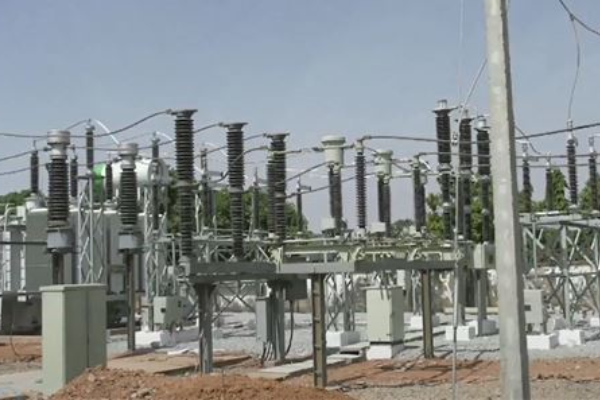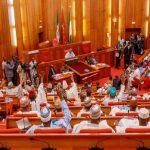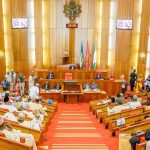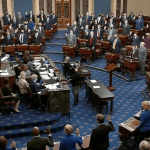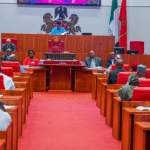The Nigerian Senate has passed a Bill to repeal the Electric Power Sector Reform Act 2005.
This Bill seeks to consolidate on existing legislations in the Electricity industry and provide an ideal institutional framework to guide the post -privatisation phase of the Industry in Nigeria.
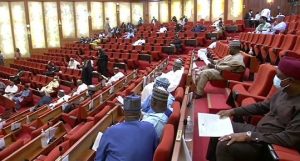
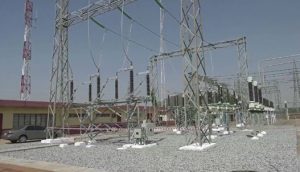
The Bill passed third reading following the consideration of a report by the Senate’s committee on Power at Plenary.
Over the years, Nigeria’s Electricity industry has suffered operational and institutional lapses which has rubbed off on many other sectors of the economy.[wonderplugin_video iframe=”https://youtu.be/JY48PUnBiD8″ lightbox=0 lightboxsize=1 lightboxwidth=960 lightboxheight=540 autoopen=0 autoopendelay=0 autoclose=0 lightboxtitle=”” lightboxgroup=”” lightboxshownavigation=0 showimage=”” lightboxoptions=”” videowidth=600 videoheight=400 keepaspectratio=1 autoplay=0 loop=0 videocss=”position:relative;display:block;background-color:#000;overflow:hidden;max-width:100%;margin:0 auto;” playbutton=”https://www.tvcnews.tv/wp-content/plugins/wonderplugin-video-embed/engine/playvideo-64-64-0.png”]
The deplorable situation led to the Privatisation of the power sector in 2013, but this did not solve the problem of erratic power supply that has greatly impacted on economic growth and development.
At the Senate’s plenary, lawmakers considered the report of the committee on power to repeal and reenact a new legislation to provide an institutional framework for the post privatisation phase of the Electricity Industry.
Senator Gabriel Suswam (PDP, Benue North East), who spoke in favor of the bill, stated that the bill’s provisions seek to promote policies and regulatory measures that would ensure the expansion of power transmission networks in Nigeria in order to address any imbalance in the existing transmission infrastructure.
Following a thorough examination of the report, the parliament was divided into a Committee of the ‘Whole’ for a clause-by-clause analysis of the Bill, after which it was passed.https://www.tvcnews.tv/2022/07/blackout-disappears-as-tcn-restores-national-grid/
With this bill, States can now generate their own power and would also be able to issue licenses to mini grids.
The Bill also expands the Powers of the Nigerian Electricity Regulatory Commission to also regulate the industry and enable it align with global best practices.
If President Buhari signs the Bill, it will, among other things, attract investments in the Nigerian Electricity Supply Industry, remove barriers to power generation, transmission, and distribution, and improve Nigerians’ living conditions.
The Nigerian Senate has passed a Bill to repeal the Electric Power Sector Reform Act 2005.
This Bill seeks to consolidate on existing legislations in the Electricity industry and provide an ideal institutional framework to guide the post -privatisation phase of the Industry in Nigeria.


The Bill passed third reading following the consideration of a report by the Senate’s committee on Power at Plenary.
Over the years, Nigeria’s Electricity industry has suffered operational and institutional lapses which has rubbed off on many other sectors of the economy.[wonderplugin_video iframe=”https://youtu.be/JY48PUnBiD8″ lightbox=0 lightboxsize=1 lightboxwidth=960 lightboxheight=540 autoopen=0 autoopendelay=0 autoclose=0 lightboxtitle=”” lightboxgroup=”” lightboxshownavigation=0 showimage=”” lightboxoptions=”” videowidth=600 videoheight=400 keepaspectratio=1 autoplay=0 loop=0 videocss=”position:relative;display:block;background-color:#000;overflow:hidden;max-width:100%;margin:0 auto;” playbutton=”https://www.tvcnews.tv/wp-content/plugins/wonderplugin-video-embed/engine/playvideo-64-64-0.png”]
The deplorable situation led to the Privatisation of the power sector in 2013, but this did not solve the problem of erratic power supply that has greatly impacted on economic growth and development.
At the Senate’s plenary, lawmakers considered the report of the committee on power to repeal and reenact a new legislation to provide an institutional framework for the post privatisation phase of the Electricity Industry.
Senator Gabriel Suswam (PDP, Benue North East), who spoke in favor of the bill, stated that the bill’s provisions seek to promote policies and regulatory measures that would ensure the expansion of power transmission networks in Nigeria in order to address any imbalance in the existing transmission infrastructure.
Following a thorough examination of the report, the parliament was divided into a Committee of the ‘Whole’ for a clause-by-clause analysis of the Bill, after which it was passed.https://www.tvcnews.tv/2022/07/blackout-disappears-as-tcn-restores-national-grid/
With this bill, States can now generate their own power and would also be able to issue licenses to mini grids.
The Bill also expands the Powers of the Nigerian Electricity Regulatory Commission to also regulate the industry and enable it align with global best practices.
If President Buhari signs the Bill, it will, among other things, attract investments in the Nigerian Electricity Supply Industry, remove barriers to power generation, transmission, and distribution, and improve Nigerians’ living conditions.
The Nigerian Senate has passed a Bill to repeal the Electric Power Sector Reform Act 2005.
This Bill seeks to consolidate on existing legislations in the Electricity industry and provide an ideal institutional framework to guide the post -privatisation phase of the Industry in Nigeria.


The Bill passed third reading following the consideration of a report by the Senate’s committee on Power at Plenary.
Over the years, Nigeria’s Electricity industry has suffered operational and institutional lapses which has rubbed off on many other sectors of the economy.[wonderplugin_video iframe=”https://youtu.be/JY48PUnBiD8″ lightbox=0 lightboxsize=1 lightboxwidth=960 lightboxheight=540 autoopen=0 autoopendelay=0 autoclose=0 lightboxtitle=”” lightboxgroup=”” lightboxshownavigation=0 showimage=”” lightboxoptions=”” videowidth=600 videoheight=400 keepaspectratio=1 autoplay=0 loop=0 videocss=”position:relative;display:block;background-color:#000;overflow:hidden;max-width:100%;margin:0 auto;” playbutton=”https://www.tvcnews.tv/wp-content/plugins/wonderplugin-video-embed/engine/playvideo-64-64-0.png”]
The deplorable situation led to the Privatisation of the power sector in 2013, but this did not solve the problem of erratic power supply that has greatly impacted on economic growth and development.
At the Senate’s plenary, lawmakers considered the report of the committee on power to repeal and reenact a new legislation to provide an institutional framework for the post privatisation phase of the Electricity Industry.
Senator Gabriel Suswam (PDP, Benue North East), who spoke in favor of the bill, stated that the bill’s provisions seek to promote policies and regulatory measures that would ensure the expansion of power transmission networks in Nigeria in order to address any imbalance in the existing transmission infrastructure.
Following a thorough examination of the report, the parliament was divided into a Committee of the ‘Whole’ for a clause-by-clause analysis of the Bill, after which it was passed.https://www.tvcnews.tv/2022/07/blackout-disappears-as-tcn-restores-national-grid/
With this bill, States can now generate their own power and would also be able to issue licenses to mini grids.
The Bill also expands the Powers of the Nigerian Electricity Regulatory Commission to also regulate the industry and enable it align with global best practices.
If President Buhari signs the Bill, it will, among other things, attract investments in the Nigerian Electricity Supply Industry, remove barriers to power generation, transmission, and distribution, and improve Nigerians’ living conditions.
The Nigerian Senate has passed a Bill to repeal the Electric Power Sector Reform Act 2005.
This Bill seeks to consolidate on existing legislations in the Electricity industry and provide an ideal institutional framework to guide the post -privatisation phase of the Industry in Nigeria.


The Bill passed third reading following the consideration of a report by the Senate’s committee on Power at Plenary.
Over the years, Nigeria’s Electricity industry has suffered operational and institutional lapses which has rubbed off on many other sectors of the economy.[wonderplugin_video iframe=”https://youtu.be/JY48PUnBiD8″ lightbox=0 lightboxsize=1 lightboxwidth=960 lightboxheight=540 autoopen=0 autoopendelay=0 autoclose=0 lightboxtitle=”” lightboxgroup=”” lightboxshownavigation=0 showimage=”” lightboxoptions=”” videowidth=600 videoheight=400 keepaspectratio=1 autoplay=0 loop=0 videocss=”position:relative;display:block;background-color:#000;overflow:hidden;max-width:100%;margin:0 auto;” playbutton=”https://www.tvcnews.tv/wp-content/plugins/wonderplugin-video-embed/engine/playvideo-64-64-0.png”]
The deplorable situation led to the Privatisation of the power sector in 2013, but this did not solve the problem of erratic power supply that has greatly impacted on economic growth and development.
At the Senate’s plenary, lawmakers considered the report of the committee on power to repeal and reenact a new legislation to provide an institutional framework for the post privatisation phase of the Electricity Industry.
Senator Gabriel Suswam (PDP, Benue North East), who spoke in favor of the bill, stated that the bill’s provisions seek to promote policies and regulatory measures that would ensure the expansion of power transmission networks in Nigeria in order to address any imbalance in the existing transmission infrastructure.
Following a thorough examination of the report, the parliament was divided into a Committee of the ‘Whole’ for a clause-by-clause analysis of the Bill, after which it was passed.https://www.tvcnews.tv/2022/07/blackout-disappears-as-tcn-restores-national-grid/
With this bill, States can now generate their own power and would also be able to issue licenses to mini grids.
The Bill also expands the Powers of the Nigerian Electricity Regulatory Commission to also regulate the industry and enable it align with global best practices.
If President Buhari signs the Bill, it will, among other things, attract investments in the Nigerian Electricity Supply Industry, remove barriers to power generation, transmission, and distribution, and improve Nigerians’ living conditions.
The Nigerian Senate has passed a Bill to repeal the Electric Power Sector Reform Act 2005.
This Bill seeks to consolidate on existing legislations in the Electricity industry and provide an ideal institutional framework to guide the post -privatisation phase of the Industry in Nigeria.


The Bill passed third reading following the consideration of a report by the Senate’s committee on Power at Plenary.
Over the years, Nigeria’s Electricity industry has suffered operational and institutional lapses which has rubbed off on many other sectors of the economy.[wonderplugin_video iframe=”https://youtu.be/JY48PUnBiD8″ lightbox=0 lightboxsize=1 lightboxwidth=960 lightboxheight=540 autoopen=0 autoopendelay=0 autoclose=0 lightboxtitle=”” lightboxgroup=”” lightboxshownavigation=0 showimage=”” lightboxoptions=”” videowidth=600 videoheight=400 keepaspectratio=1 autoplay=0 loop=0 videocss=”position:relative;display:block;background-color:#000;overflow:hidden;max-width:100%;margin:0 auto;” playbutton=”https://www.tvcnews.tv/wp-content/plugins/wonderplugin-video-embed/engine/playvideo-64-64-0.png”]
The deplorable situation led to the Privatisation of the power sector in 2013, but this did not solve the problem of erratic power supply that has greatly impacted on economic growth and development.
At the Senate’s plenary, lawmakers considered the report of the committee on power to repeal and reenact a new legislation to provide an institutional framework for the post privatisation phase of the Electricity Industry.
Senator Gabriel Suswam (PDP, Benue North East), who spoke in favor of the bill, stated that the bill’s provisions seek to promote policies and regulatory measures that would ensure the expansion of power transmission networks in Nigeria in order to address any imbalance in the existing transmission infrastructure.
Following a thorough examination of the report, the parliament was divided into a Committee of the ‘Whole’ for a clause-by-clause analysis of the Bill, after which it was passed.https://www.tvcnews.tv/2022/07/blackout-disappears-as-tcn-restores-national-grid/
With this bill, States can now generate their own power and would also be able to issue licenses to mini grids.
The Bill also expands the Powers of the Nigerian Electricity Regulatory Commission to also regulate the industry and enable it align with global best practices.
If President Buhari signs the Bill, it will, among other things, attract investments in the Nigerian Electricity Supply Industry, remove barriers to power generation, transmission, and distribution, and improve Nigerians’ living conditions.
The Nigerian Senate has passed a Bill to repeal the Electric Power Sector Reform Act 2005.
This Bill seeks to consolidate on existing legislations in the Electricity industry and provide an ideal institutional framework to guide the post -privatisation phase of the Industry in Nigeria.


The Bill passed third reading following the consideration of a report by the Senate’s committee on Power at Plenary.
Over the years, Nigeria’s Electricity industry has suffered operational and institutional lapses which has rubbed off on many other sectors of the economy.[wonderplugin_video iframe=”https://youtu.be/JY48PUnBiD8″ lightbox=0 lightboxsize=1 lightboxwidth=960 lightboxheight=540 autoopen=0 autoopendelay=0 autoclose=0 lightboxtitle=”” lightboxgroup=”” lightboxshownavigation=0 showimage=”” lightboxoptions=”” videowidth=600 videoheight=400 keepaspectratio=1 autoplay=0 loop=0 videocss=”position:relative;display:block;background-color:#000;overflow:hidden;max-width:100%;margin:0 auto;” playbutton=”https://www.tvcnews.tv/wp-content/plugins/wonderplugin-video-embed/engine/playvideo-64-64-0.png”]
The deplorable situation led to the Privatisation of the power sector in 2013, but this did not solve the problem of erratic power supply that has greatly impacted on economic growth and development.
At the Senate’s plenary, lawmakers considered the report of the committee on power to repeal and reenact a new legislation to provide an institutional framework for the post privatisation phase of the Electricity Industry.
Senator Gabriel Suswam (PDP, Benue North East), who spoke in favor of the bill, stated that the bill’s provisions seek to promote policies and regulatory measures that would ensure the expansion of power transmission networks in Nigeria in order to address any imbalance in the existing transmission infrastructure.
Following a thorough examination of the report, the parliament was divided into a Committee of the ‘Whole’ for a clause-by-clause analysis of the Bill, after which it was passed.https://www.tvcnews.tv/2022/07/blackout-disappears-as-tcn-restores-national-grid/
With this bill, States can now generate their own power and would also be able to issue licenses to mini grids.
The Bill also expands the Powers of the Nigerian Electricity Regulatory Commission to also regulate the industry and enable it align with global best practices.
If President Buhari signs the Bill, it will, among other things, attract investments in the Nigerian Electricity Supply Industry, remove barriers to power generation, transmission, and distribution, and improve Nigerians’ living conditions.
The Nigerian Senate has passed a Bill to repeal the Electric Power Sector Reform Act 2005.
This Bill seeks to consolidate on existing legislations in the Electricity industry and provide an ideal institutional framework to guide the post -privatisation phase of the Industry in Nigeria.


The Bill passed third reading following the consideration of a report by the Senate’s committee on Power at Plenary.
Over the years, Nigeria’s Electricity industry has suffered operational and institutional lapses which has rubbed off on many other sectors of the economy.[wonderplugin_video iframe=”https://youtu.be/JY48PUnBiD8″ lightbox=0 lightboxsize=1 lightboxwidth=960 lightboxheight=540 autoopen=0 autoopendelay=0 autoclose=0 lightboxtitle=”” lightboxgroup=”” lightboxshownavigation=0 showimage=”” lightboxoptions=”” videowidth=600 videoheight=400 keepaspectratio=1 autoplay=0 loop=0 videocss=”position:relative;display:block;background-color:#000;overflow:hidden;max-width:100%;margin:0 auto;” playbutton=”https://www.tvcnews.tv/wp-content/plugins/wonderplugin-video-embed/engine/playvideo-64-64-0.png”]
The deplorable situation led to the Privatisation of the power sector in 2013, but this did not solve the problem of erratic power supply that has greatly impacted on economic growth and development.
At the Senate’s plenary, lawmakers considered the report of the committee on power to repeal and reenact a new legislation to provide an institutional framework for the post privatisation phase of the Electricity Industry.
Senator Gabriel Suswam (PDP, Benue North East), who spoke in favor of the bill, stated that the bill’s provisions seek to promote policies and regulatory measures that would ensure the expansion of power transmission networks in Nigeria in order to address any imbalance in the existing transmission infrastructure.
Following a thorough examination of the report, the parliament was divided into a Committee of the ‘Whole’ for a clause-by-clause analysis of the Bill, after which it was passed.https://www.tvcnews.tv/2022/07/blackout-disappears-as-tcn-restores-national-grid/
With this bill, States can now generate their own power and would also be able to issue licenses to mini grids.
The Bill also expands the Powers of the Nigerian Electricity Regulatory Commission to also regulate the industry and enable it align with global best practices.
If President Buhari signs the Bill, it will, among other things, attract investments in the Nigerian Electricity Supply Industry, remove barriers to power generation, transmission, and distribution, and improve Nigerians’ living conditions.
The Nigerian Senate has passed a Bill to repeal the Electric Power Sector Reform Act 2005.
This Bill seeks to consolidate on existing legislations in the Electricity industry and provide an ideal institutional framework to guide the post -privatisation phase of the Industry in Nigeria.


The Bill passed third reading following the consideration of a report by the Senate’s committee on Power at Plenary.
Over the years, Nigeria’s Electricity industry has suffered operational and institutional lapses which has rubbed off on many other sectors of the economy.[wonderplugin_video iframe=”https://youtu.be/JY48PUnBiD8″ lightbox=0 lightboxsize=1 lightboxwidth=960 lightboxheight=540 autoopen=0 autoopendelay=0 autoclose=0 lightboxtitle=”” lightboxgroup=”” lightboxshownavigation=0 showimage=”” lightboxoptions=”” videowidth=600 videoheight=400 keepaspectratio=1 autoplay=0 loop=0 videocss=”position:relative;display:block;background-color:#000;overflow:hidden;max-width:100%;margin:0 auto;” playbutton=”https://www.tvcnews.tv/wp-content/plugins/wonderplugin-video-embed/engine/playvideo-64-64-0.png”]
The deplorable situation led to the Privatisation of the power sector in 2013, but this did not solve the problem of erratic power supply that has greatly impacted on economic growth and development.
At the Senate’s plenary, lawmakers considered the report of the committee on power to repeal and reenact a new legislation to provide an institutional framework for the post privatisation phase of the Electricity Industry.
Senator Gabriel Suswam (PDP, Benue North East), who spoke in favor of the bill, stated that the bill’s provisions seek to promote policies and regulatory measures that would ensure the expansion of power transmission networks in Nigeria in order to address any imbalance in the existing transmission infrastructure.
Following a thorough examination of the report, the parliament was divided into a Committee of the ‘Whole’ for a clause-by-clause analysis of the Bill, after which it was passed.https://www.tvcnews.tv/2022/07/blackout-disappears-as-tcn-restores-national-grid/
With this bill, States can now generate their own power and would also be able to issue licenses to mini grids.
The Bill also expands the Powers of the Nigerian Electricity Regulatory Commission to also regulate the industry and enable it align with global best practices.
If President Buhari signs the Bill, it will, among other things, attract investments in the Nigerian Electricity Supply Industry, remove barriers to power generation, transmission, and distribution, and improve Nigerians’ living conditions.

